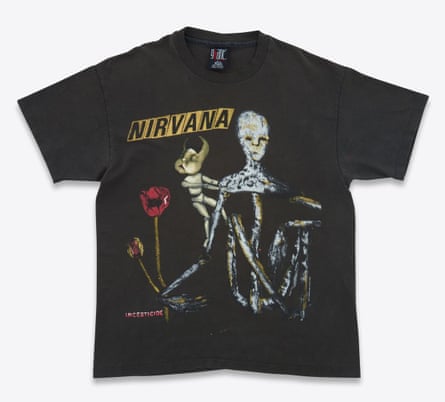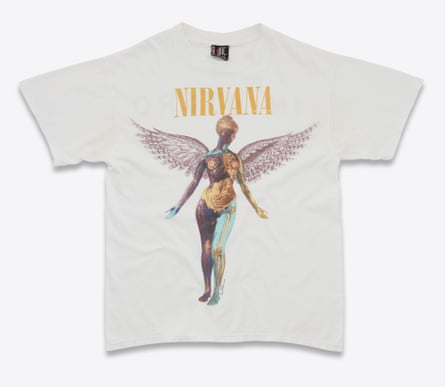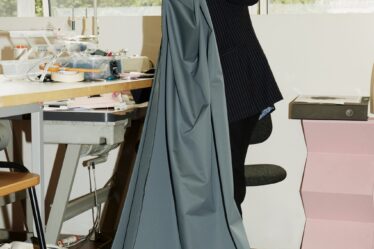
Once the preserve of fans in moshpits at gigs, the band T-shirt cemented its high fashion status this week with an endorsement from a luxury fashion brand – and the price tag to match.
As part of their ‘The Vintage’ collection, Saint Laurent is now selling secondhand band T-shirts for thousands of pounds. Nirvana dominates with the classic smiley face T-shirt selling for £700 and an In Utero T-shirt priced at £2,510. One T-shirt – featuring the cover of 1992 compilation Incesticide – has hit the headlines. It was sold for an eye-watering £3,295.
These items – and their prices – have been shared on social media. Sonic Youth’s Kim Gordon – a friend of Nirvana – posted an article about the T-shirts on Instagram with the (presumably ironic) caption “Sick! So punk!” On Twitter, a Nirvana fans complained with one commenting it was “the opposite of what [frontman] Kurt [Cobain] would have wanted. He thought $20 was too much for a concert ticket”.
Some in music may find these prices hard to swallow, but the majority of the T-shirts have already been sold, reflecting the fact that people are willing to shell out for something once sold for peanuts at a merchandise stall. “In the last 10 years, it’s grown massively,” says Deeps Samra, the founder of Catalogue London, a website that sells vintage T-shirts and merchandise. “The prices just keep going up.” Matt Sloane, the founder of vintage T-shirt and memorabilia store Jerks, explains a rule of thumb. “If an original LP is worth £300 then you can be pretty certain that the corresponding T-shirt is going to be worth the same or more,” he says.

Samra says the most he earned from a T-shirt for was £1,000, for a Björk T-shirt, while Sloane says he sold an Aphex Twin T-shirt – the same design worn by musician Frank Ocean – for £2,500. Both say that the Saint Laurent prices are inflated but, as Sloane says, “you’re paying for the experience of buying something from Saint Laurent, it’s a one on one. It’s what to expect.”
Nirvana T-shirts in particular are sought after. Saint Laurent’s offerings are not the most expensive ever sold. A collector in Japan paid $8,500 (£6,608) for a T-shirt featuring all the band while a Sonic Youth T-shirt worn by Cobain in 1994 sold for $25,000 (£19,439) in 2014. Jacob McMurray, who curated an exhibition of Nirvana memorabilia at Seattle’s Museum of Pop Culture in 2018, says this market is timely. “[Grunge is] 30 years ago, so there’s this nostalgia around it. The kids that grew up listening to that music are now the people in power and have money to be able to afford this stuff.”
Sloane says Saint Laurent’s focus on Nirvana makes sense. “It’s like low hanging fruit. The band are big enough to get the attention they want [as opposed to] someone one step more obscure.”
People have long collected T-shirts but it is only recently that the prices have rocketed to eye-watering levels. Photographer David Titlow released a book in 2016, Teetotal, showcasing his collection. “Back in the late nineties, you could buy brilliant vintage T-shirts everywhere [at thrift stores] in New York. Now it’s just impossible because people are just totally wise to it.”
after newsletter promotion
Sara Blanco, a collector based in Los Angeles, began collecting T-shirts as a teenager. She has noted the price rises. “I used to have a Sade Summer Deluxe Tour 1993 that was my favourite I gave to an ex boyfriend,” she says. “It’s now retailing for almost $2,000 (£1,556). I regret this deeply.”
While vintage dealers feel the Saint Laurent effect will benefit their businesses – “the fact that a huge brand is standing with us [in] vintage is putting more eyes on our small community,” says Samra – Blanco neatly dismisses anyone who bought a four figure Nirvana T-shirt. “Let’s be honest,” she says. “If someone told you they got their vintage T-shirt through a fashion house sourcing it, you’d be like ‘that’s even dorkier than being a collector’.”



